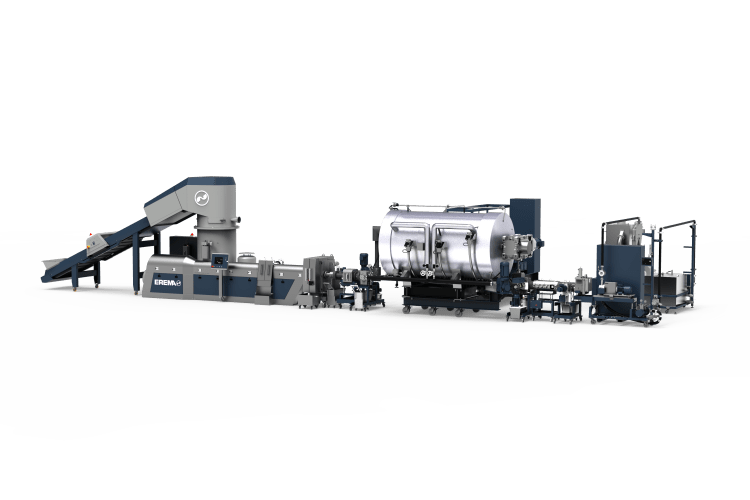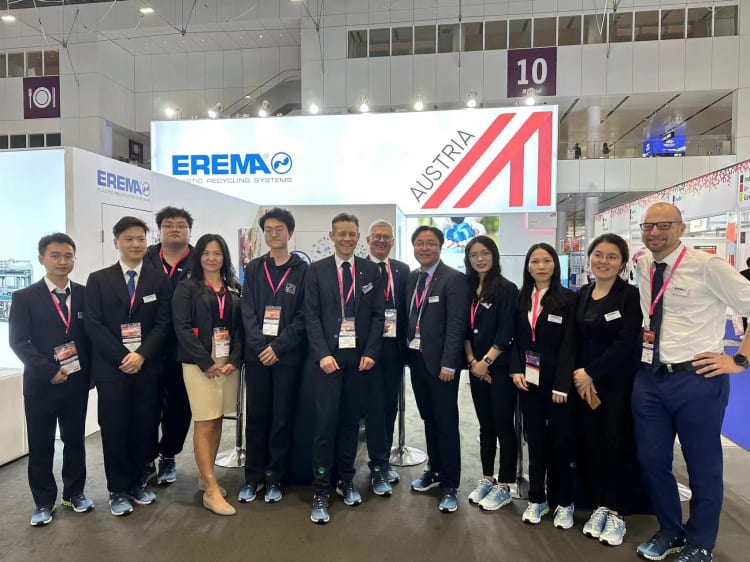Food-safe rPET on the increase - also in the textile industry
As well as in the food sector, food-compliant rPET is also playing an increasingly important role in the textile industry. Well-known brands are relying more and more on recycled PET as a material that meets the requirements for food grade specifications in order to be able to offer their customers textiles that are both sustainable and safe from a health perspective. This trend is reflected by the increase in sales of bottle-to-fibre applications at Erema. Asia is an important market in this segment.
Ultimately, the textile industry is increasing the demand for PET recycling. Around two thirds of the total volume of PET flows into the production of synthetic fibres. Erema has responded by setting up its own business application for fibres and textiles.
Gentle material preparation for fibre-to-fibre
The Intarema FibrePro:IV machine was developed specifically for fibre-to-fibre recycling. Proven Intarema technology combined with the new IV Uptimiser succeeds in processing shredded PET fibre materials heavily contaminated by spinning oils in such a way that the finest fibres can be produced again from the recycled pellets. The system features active surface renewal of the melt in a vacuum atmosphere, which focuses on removing the spinning oils and other additives more efficiently than conventional PET recycling processes. Following extrusion, the intrinsic viscosity is increased in the new IV Uptimiser by polycondensation of the PET melt to the level that is needed for fibre production. "With this recycling process, we achieve high-quality rPET pellets that are used for the production of fibres as fine as 2 dtex, even with an rPET content of 100 percent," emphas James Qiu.
To drive forward developments in PET fibre recycling, the Erema Group has set up a fibre technical centre at its headquarters in Ansfelden, Austria. Here, a team of experts from a wide spectrum of disciplines operates a fully equipped and flexible industrial-scale recycling machine. It includes the peripheral technology required and is available to customers for trials.

Erema has developed Intarema FibrePro:IV specifically for fibre-to-fibre recycling to meet the requirements of the textile industry.
Local subsidiary focuses on customers
Focusing on customers has always been a clear goal for Erema. In order to be able to visit customers in person at short notice in China, the company opened a subsidiary in Shanghai in 2001. "Our experts in processing technology and start-up are available to meet our customers' special requirements in PET recycling and beyond," says James Qiu. The Erema experts also help prepare for the approval procedures required for the production of food contact compliant rPET. In many other regions in Asia, Erema works together with local representatives and has its own in-country sales and service teams.

At Chinaplas 2024, the Erema expert teams will once again be on hand to share their expertise with visitors. (Photo from Chinaplas 2023)
Visit Erema at Chinaplas: Hall 2.1, Stand: 2.1C55



